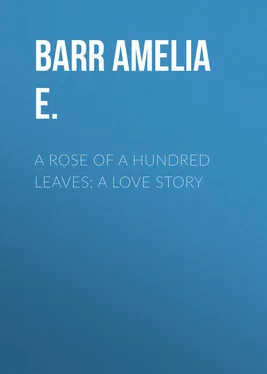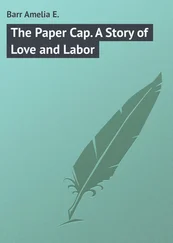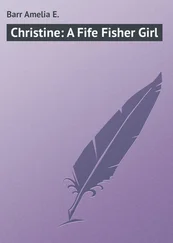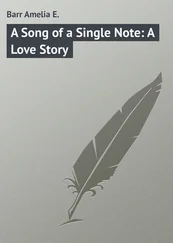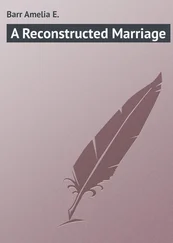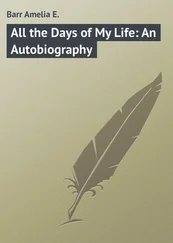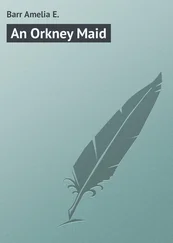Amelia Barr - A Rose of a Hundred Leaves - A Love Story
Здесь есть возможность читать онлайн «Amelia Barr - A Rose of a Hundred Leaves - A Love Story» — ознакомительный отрывок электронной книги совершенно бесплатно, а после прочтения отрывка купить полную версию. В некоторых случаях можно слушать аудио, скачать через торрент в формате fb2 и присутствует краткое содержание. Жанр: foreign_prose, Зарубежные любовные романы, на английском языке. Описание произведения, (предисловие) а так же отзывы посетителей доступны на портале библиотеки ЛибКат.
- Название:A Rose of a Hundred Leaves: A Love Story
- Автор:
- Жанр:
- Год:неизвестен
- ISBN:нет данных
- Рейтинг книги:4 / 5. Голосов: 1
-
Избранное:Добавить в избранное
- Отзывы:
-
Ваша оценка:
- 80
- 1
- 2
- 3
- 4
- 5
A Rose of a Hundred Leaves: A Love Story: краткое содержание, описание и аннотация
Предлагаем к чтению аннотацию, описание, краткое содержание или предисловие (зависит от того, что написал сам автор книги «A Rose of a Hundred Leaves: A Love Story»). Если вы не нашли необходимую информацию о книге — напишите в комментариях, мы постараемся отыскать её.
A Rose of a Hundred Leaves: A Love Story — читать онлайн ознакомительный отрывок
Ниже представлен текст книги, разбитый по страницам. Система сохранения места последней прочитанной страницы, позволяет с удобством читать онлайн бесплатно книгу «A Rose of a Hundred Leaves: A Love Story», без необходимости каждый раз заново искать на чём Вы остановились. Поставьте закладку, и сможете в любой момент перейти на страницу, на которой закончили чтение.
Интервал:
Закладка:
“As if it needed such contrivances!” he muttered angrily. “When it does, it is a broken thread, and no Anneys can knot it again.”
The weeks that followed were full of new interests to Aspatria. Mistress Frostham, the wife of a near shepherd-lord, had been the friend of Aspatria’s mother; she was fairly conversant with the world outside the fells and dales, and she took the girl under her care, accompanied her to Whitehaven, and directed her in the purchase of all considered necessary for the wife of Ulfar Fenwick.
Then the deep snows shut in Seat-Ambar, and the great white hills stood round about it like fortifications. But as often as it was possible the Dalton postman fought his way up there, with his packet of accumulated mail; for he knew that a warm welcome and a large reward awaited him. In the main, the long same days went happily by. William and Brune had a score of resources for the season; the farm-servants worked in the barn; they were making and mending sacks for the wheat, and caps for the sheeps’ heads in fly-time, sharpening scythes and tools, doing the indoor work of a great farm, and mostly singing as they did it.
As Aspatria sat in her room, surrounded by fine cambric and linen and that exquisite English thread-lace now gone out of fashion, she could hear their laughter and their song, and she unconsciously set her stitches to its march and melody. The days were not long to her. So many dozens of garments to make with her own slight fingers! She had not a moment to waste, but the necessity was one of the sweetest delight. The solitude and secrecy of her labour added to its charm. She never took her sewing into the parlour. And yet she might have done so: William and Brune had a delicacy of affection for her which would have made them blind to her occupation and densely stupid as to its design.
So, although the days were mostly alike, they were not unhappily so; and at intervals destiny sent her the surprises she loved. One morning in the beginning of February, Aspatria felt that the postman ought to come; her heart presaged him. The day was clear and warm, – so much so, that the men working in the barn had all the windows open. They were singing in rousing tones the famous North Country song to the barley-mow, and drinking it through all its verses, out of the jolly brown bowl, the nipperkin, the quarter-pint, the quart and the pottle, – the gallon and the anker, – the hogshead and the pipe, – the well, and the river, and the ocean, – and then rolling back the chorus, from ocean to the jolly brown bowl. Suddenly, while a dozen men were shouting in unison, —
“Here’s a health to the barley mow!”
the verse was broken by the cry of “Here comes Ringham the postman!” Then Aspatria ran to the window and saw him climbing the fell. She did not like to go downstairs until Will called her; but she could not sew another stitch. And when at last the aching silence in her ears was filled by Will’s joyful “Come here, Aspatria! Here is such a parcel as never was, – from foreign parts too!” she hardly knew how her feet twinkled down the long corridor and stairs.
The parcel was from Rome. Ulfar had sent it to his London banker, and the banker had sent a special messenger to Dalton with it. Over the fells at that season no one but Ringham could have found a safe way; and Ringham was made so welcome that he was quite imperious. He ordered himself a rasher of bacon, and a bowl of the famous barley broth, and spread himself comfortably before the great hearth-place. At the table stood Aspatria, William, and Brune. Aspatria was nervously trying to undo the seals and cords that bound love’s message to her. Will finally took his pocket-knife and cut them. There was a long letter, and a box containing exquisite ornaments of Roman cameos, – precious onyx, made more precious by work of rare artistic beauty, a comb for her dark hair, a necklace for her white throat, bracelets for her slender wrists, a girdle of stones linked with gold for her waist. Oh, how full of simple delight she was! She was too happy to speak. Then Will discovered a smaller package. It was for himself and Brune. Will’s present was a cameo ring, on which were engraved the Anneys and Fenwick arms. Brune had a scarf-pin, representing a lovely Hebe. It was a great day at Seat-Ambar. Aspatria could work no more; Will and Brune felt it impossible to finish the game they had begun.
There is a tide in everything: this was the spring-tide of Aspatria’s love. In its overflowing she was happy for many a day after her brothers had begun to speculate and wonder why Ringham did not come. Suddenly it struck her that the snow was gone, and the road open, and that there was no letter. She began to worry, and Will quietly rode over to Dalton, to ask if any letter was lying there. He came back empty-handed, silent, and a little surly. The anniversary of their meeting was at hand: surely Ulfar would remember it, so Aspatria thought, and she watched from dawn to dark, but no token of remembrance came. The flowers began to bloom, the birds to sing, the May sunshine flooded the earth with glory, but fear and doubt and dismay and daily disappointment made deepest, darkest winter in the low, long room where Aspatria watched and waited. Her sewing had been thrown aside. The half-finished garments, neatly folded, lay under a cover she had no strength to remove.
In June she wrote a pitiful little note to her lover. She said that he ought to tell her, if he was tired of their engagement. She told Will what she had said, and asked him to post the letter. He answered angrily, “Don’t you write a word to him, good or bad!” And he tore the letter into twenty pieces before her eyes.
“Oh, Will, I cannot bear it!”
“Thou art a woman: bear what other women have tholed before thee.” Then he went angrily from her presence. Brune was thrumming on the window-pane. She thought he looked sorry for her; she touched his arm and said, “Brune, will you take a letter to Dalton post for me?”
“For sure I will. Go thy ways and write it, and I’ll be gone before Will is back.”
It was an unfortunate letter, as letters written in a hurry always are. Absolute silence would have piqued and worried Ulfar. He would have fancied her ill, dying perhaps; and the uncertainty, vague and portentous, would have prompted him to action, if only to satisfy his own mind. Sometimes he feared that a girl so sensitive would fade away in neglect; and he expected a letter from William Anneys saying so. But a hurried, halting, not very correct epistle, whose whole tenour was, “What is the matter? What have I done? Do you remember last year at this time?” irritated him beyond reply.
He was still in Italy when it reached him. Sir Thomas Fenwick was not likely ever to return to England. He was slowly dying, and he had been removed to a villa in the Italian hills. And Elizabeth Redware had a friend with her, a young widow just come from Athens, who affected at times its splendid picturesque national costume. She was a very bright, handsome woman, whose fine education had been supplemented by travel, society, and a rather unhappy matrimonial experience. She knew how to pique and provoke, how to flirt to the very edge of danger and then sheer off, how to manipulate men before the fire of passion, as witches used to manipulate their waxen images before the blazing coals.
She had easily won Ulfar’s confidence; she had even assisted in the selection of the cameos; and she declared to Elizabeth that she would not for a whole world interfere between Ulfar and his pretty innocent! A natural woman was such a phenomenon! She was glad Ulfar was going to marry a phenomenon.
Elizabeth knew her better. She gave the couple opportunity, and they needed nothing more. There were already between them a good understanding, transparent secrets, little jokes, a confessed confidence. They quickly became affectionate. The lovely Sarah, relict of Herbert Sandys, Esq., not only reminded Ulfar of his vows to Aspatria, but in the very reminder she tempted him to break them. When Aspatria’s letter was put into his hand, she was with him, marvellously arrayed in tissue of silver and brilliant colours. A head-dress of gold coins glittered in her fair braided hair; her long white arms were shining with bracelets; she was at once languid and impulsive, provoking Elizabeth and Ulfar to conversation, and then amazing them by the audacity and contradiction of her opinions.
Читать дальшеИнтервал:
Закладка:
Похожие книги на «A Rose of a Hundred Leaves: A Love Story»
Представляем Вашему вниманию похожие книги на «A Rose of a Hundred Leaves: A Love Story» списком для выбора. Мы отобрали схожую по названию и смыслу литературу в надежде предоставить читателям больше вариантов отыскать новые, интересные, ещё непрочитанные произведения.
Обсуждение, отзывы о книге «A Rose of a Hundred Leaves: A Love Story» и просто собственные мнения читателей. Оставьте ваши комментарии, напишите, что Вы думаете о произведении, его смысле или главных героях. Укажите что конкретно понравилось, а что нет, и почему Вы так считаете.
